The Hobbit: The Battle of the Five Armies
 for extended sequences of intense fantasy action violence, and frightening images.
for extended sequences of intense fantasy action violence, and frightening images.
reviewed by: Raphael Vera
CONTRIBUTOR
| Moral Rating: | Average |
| Moviemaking Quality: |
|
| Primary Audience: | Adults Teens |
| Genre: | Adventure Fantasy Adaptation Sequel 3D IMAX |
| Length: | 2 hr. 24 min. |
| Year of Release: | 2014 |
| USA Release: |
December 17, 2014 (wide—3,850+ theaters) DVD: March 24, 2015 |
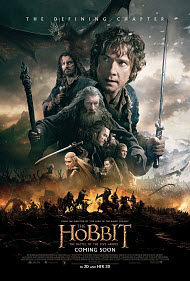

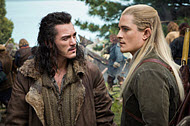
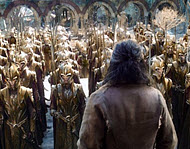
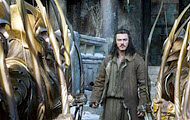
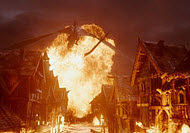
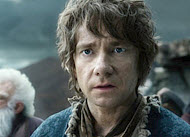
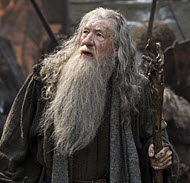
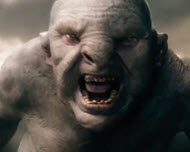
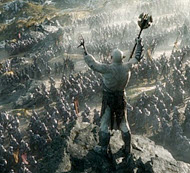
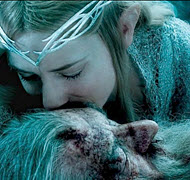
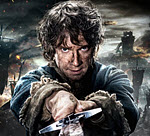
battle between evil and good
dragons and dinosaurs—discover how they are connected
dragons in the Bible
courage / bravery
about the novel: The Hobbit, or There and Back Again by J.R.R. Tolkien (Wikipedia)
madness
temptation in the Bible
How can I deal with temptations? Answer
armies in the Bible
rings in the Bible
Treasures in the Bible: treasure cities, treasure houses, treasury
The Lord of the Rings: The Fellowship of the Ring (2001)
| Featuring |
|---|
|
Luke Evans … Bard Benedict Cumberbatch … Smaug / Necromancer Lee Pace … Thranduil Evangeline Lilly … Tauriel Richard Armitage … Thorin Oakenshield Cate Blanchett … Galadriel Manu Bennett … Azog Orlando Bloom … Legolas Christopher Lee … Saruman Martin Freeman … Bilbo Baggins Ian McKellen … Gandalf Hugo Weaving … Elrond Aidan Turner … Kili See all » |
| Director |
|
Peter Jackson |
| Producer |
|
New Line Cinema Metro-Goldwyn-Mayer See all » |
| Distributor |
Prequels: “The Hobbit: An Unexpected Journey” (2012), “The Hobbit: The Desolation of Smaug” (2013)
A small and unassuming Hobbit named Bilbo Baggins (Martin Freeman), under the encouragement of the powerful but kindly wizard Gandalf (Ian McKellen) has joined a company of dwarves who are set on reclaiming their kingdom under a mountain that was seized from them years ago by the most fearsome and cunning dragon of all, Smaug. Their adventures leading up to this confrontation were detailed in first, “The Hobbit: An Unexpected Journey” and then, “The Hobbit: The Desolation of Smaug.”
Bilbo and his dwarf comrades have been confronting all kinds of dangers during their journey battling monstrous orcs, wargs, trolls, goblins and giant spiders. Beyond that, they have managed incredible escapes from enormous beings of living rock and from the hands of the kingdom of Wood-elves, all leading up to their confrontation with the nigh invincible Smaug, voiced with a noted fiendish pleasure by Benedict Cumberbatch.
However, failing to destroy the monster, they have instead ignited Smaug’s fury who turns on the nearby residents of Laketown. Regardless of the outcome, the dwarves are determined to fight for their former kingdom, and soon the armies of elves, men, dwarves, orcs, goblins and more will gather for war at the steps of their mountain.
Obsession drives the dwarf throne’s true heir Thorin Oakenshield (Richard Armitage), close behind is the greed of the Elfin King Thranduil (Lee Pace), while love motivates much in the hearts of both Prince Legolas (Orlando Bloom) and his Captain of the guard Tauriel (Evangeline Lilly) with ample measures of loyalty and honor driving the rest of Thorin’s company. All shall soon have their mettle tested, and, for some, it will be their last time.
“The Hobbit: Battle of the Five Armies” is a wonderfully told, meticulously crafted, spectacularly epic film that concludes “The Hobbit” trilogy in a rousing fashion, while managing to make fantasy realm characters relatable to the audience. As with Director Peter Jackson’s other “Middle-Earth” films there are familiar concerns with some of the content.
Objectionable Content
Violence: Very heavy. Set in a mythological age where powerful races (including monsters) rule, death is an all too common occurrence with weapons used ranging from spears, blades, axes, hammers, catapults and more. During battle, death can come any number of ways, including spearing, stabbing, and cutting through body, throat, head and heart, though it is just as common to be crushed from monsters or debris, as it is to be burned alive by the dragon Smaug. People are also thrown from high places, and many foes are seen decapitated. Several particularly tragic death blows are delivered just offscreen, but blood and gore are not featured. This film, of course, cannot be recommended for pre-teens or smaller children.
Language. Mild. The Lord’s name is never taken in vain, and the only use of ‘Lord’ is in reference to station or title, as in “My Liege/Lord”. The Dwarf leader Dain (Billy Connolly) who uses a derogatory term for illegitimate children (bast***) and also exclaims, “Sod off” which, depending on the context may or may not be a curse in the British isles, no other foul language was noted.
Sex/Nudity: None.
Occult: Although J.R.R. Tolkien’s Christian faith is well known, God is never referred to directly. Inferences can be made that the wizards represent angelic beings, but without clarifying language, a scene, for example, with the wizard Radagast chanting during a trance-like state can easily be taken for the occult. Even the good Elfin Queen Galadriel (Cate Blanchett) appears almost demonic when exercising her power to the fullest. A point should probably be made that none of these scenes from the film are written about in Tolkien’s book.
Lessons
Moral lessons abound in the written works of J.R.R. Tolkien, and many books have been written with this focus, but taking only the film into consideration here are a few themes that stand out.
Greed is the most prevalent vice in the movie. Witness the Master of Laketown stealing the village’s treasury, the Elfin King’s willingness to go to war over heirlooms of ‘white gold’ or even Thorin’s obsession with reclaiming the Arkenstone, and contrast them against Bard’s desire only to see to the safety of his children (his treasure), and it is easy to realize that the Word of God spoke clearly about this.
“So is the one who lays up treasure for himself and is not rich toward God.” —Luke 12:21
“For where your treasure is, there your heart will be also.” —Matthew 6:21
Bard (Luke Evans) likewise shows wisdom when he is offered the chance to lay claim to great riches, but instead insists taking only enough to rebuild Laketown.
“Better is a little with the fear of the Lord than great treasure and trouble with it.” —Proverbs 15:16
Bard’s son is terrified, understandably, in the midst of probable death, when Bard tells him simply to turn and look at him. By focusing on his father, he is able to calm down, and his faith is rewarded.
Likewise, the Apostle Peter was even able to walk on water, but only while he kept his eyes on Jesus.
“Shortly before dawn Jesus went out to them, walking on the lake. When the disciples saw him walking on the lake, they were terrified. “It’s a ghost,” they said, and cried out in fear.
But Jesus immediately said to them: “Take courage! It is I. Don’t be afraid.”
“Lord, if it’s you,” Peter replied, “tell me to come to you on the water.”
“Come,” he said.
Then Peter got down out of the boat, walked on the water and came toward Jesus. But when he saw the wind, he was afraid and, beginning to sink, cried out, “Lord, save me!” (Matthew 14:25-30)
What wonders will we behold if we only look to our Father in heaven in faith and trust in his providence?
The people of Laketown degenerate into a mob and wish to punish the cowardly and self-seeking Alfrid, former deputy to the town’s master, but Bard intervenes and is not intent on exacting any revenge.
“Dearly beloved, avenge not yourselves, but rather give place unto wrath: for it is written, Vengeance is mine; I will repay, saith the Lord.” —Romans 12:19
A pivotal scene is the confrontation with the demonic Necromancer, where the forces for good are attempting to banish him to ‘whence he came’. Our Lord Jesus gave his Apostles, and then later us as his children, the power to repel evil as well as the evil one himself, and this battle should remind us that all those ‘in Christ’ can do this!
“Submit yourselves therefore to God. Resist the devil, and he will flee from you.” —James 4:7
During the same confrontation, Galadriel is exhausted and spent with no apparent reserves left. Yet, holding the ‘Phial of Galadriel’ a power not hers but suddenly within her now is able to overcome the personification of the darkness in this world. This is similar to what the Apostle John affirmed when he said:
“Ye are of God, my little children, and have overcome them: because greater is he that is in you than he that is in the world.” —1 John 4:4
Bilbo may have begun his adventure as the archetype of the ‘unwilling hero,’ similar in some respects to Frodo in ‘The Lord of the Rings,’ but by tale’s end he embodies many of the Christian traits that are only brought to light in our own lives through adversity, and this is exactly what we should expect.
“Beloved, do not be surprised at the fiery trial when it comes upon you to test you, as though something strange were happening to you. But rejoice, insofar as you share Christ’s sufferings…” —1 Peter 1:12
As God’s adopted children, it is through these adversities that we become his church here on Earth.
“…you also, like living stones, are being built into a spiritual house to be a holy priesthood, offering spiritual sacrifices acceptable to God through Jesus Christ.” —1 Peter 2:5
Perhaps my favorite line in the movie is when Bilbo remarks to Gandalf how lucky it is for him to be with the wizard, but Gandalf interjects, in so many words, that it is divine providence that made the difference, when he tells him,
“You [Bilbo] don’t really suppose do you, that all your adventures and escapes were managed by mere luck?”
“The Hobbit: Battle of the Five Armies” is the finale that fans of the movies have been waiting for, and, yes, is even more impressive if you are able to see it in IMAX. While liberties are clearly taken, fans of the book may still be pleased with how the director managed to both highlight positive values and especially expand on a final battle that was only one chapter in the book to an intensely gripping and climactic third of the film. The addition of characters, such as Legolas and Tauriel’s love for the dwarf Kili, serve the narrative well, in my opinion. Strong caution for parents of younger children, but an enthusiastic recommendation for the rest of us who love experiencing a unique and great adventure!
Violence: Very heavy / Profanity: Mild / Sex/Nudity: None
See list of Relevant Issues—questions-and-answers.


Moral rating: Better than Average / Moviemaking quality:
Meanwhile, Saruman the White tells his very powerful friends that he alone should finish Sauron off, take him down, etc. He is actually confused, and at the point of surrendering his allegiance to Sauron, but does not reveal this secret so that he may be confronted and have some sense talked into him.
Bilbo is the only character with a consistent moral compass the whole journey through, as he will never raise a hand to fight anyone, be they elf or dwarf. Even Bard is willing to, after much diplomacy, regrettably allow the lives of the other dwarves in the stronghold to be sacrificed because of Thorin’s stubbornness.
Gandalf comes in a little too late, but even he only offers a word of rebuke to Thorin, and does not place himself in their midst as a friend as Bilbo did.
Despite this well-constructed storyline, there were P.J. Bits of it that flew into my eye like a crumb the size of Greenland. Mr. Jackson may have done a phenomenal job with the special effects, but why dedicate so much of it to Orcs backstories? Why not include more of the actual battle, with Beorn rushing at the bodyguard of Bolg the goblin and the eagles picking up goblins and dropping them to the ground (like in the book), instead of zooming into these armored freaks like torpedoes and smashing them with their… umm… faces? How is that even possible without giving the birds permanent facial scars?
And why did there need to be ANY intelligent monologues coming from Orcs? To extend the depths of how evil they are? If that was the intention then at their deaths, they become tragic figures instead of mere brutes… which they are.
There is a definite usurpation of sound morals in this film, but enough good ones where you know that (I suppose even the intelligent bad guys) get what is coming to them.
Moral rating: Average / Moviemaking quality: 4½
Moral rating: Good / Moviemaking quality: 5
So, here is what you do… Watch the first 35 minutes, then skip to the last 30 minutes. What do you miss?… a 75 minute computer generated battle scene that just grinds along long after you wish it was over.
Moral rating: Average / Moviemaking quality: 4½
The “dark magic” scenes were also much scarier/oppressive than the original movies. Apart from the ongoing storyline (Lord Of The Rings), this film bore no real resemblence to the original trilogy. There was no light humour from either the Dwarves, the Elves or the (singular) Hobbit.
No sense of redemption or relief, when the story had eventually come to a close, and apart from a edge-of-the-seat thrill ride, the movie had no real memorable moments. If you want to enjoy fantasy properly, go and buy the original Lord Of The Rings (extended version).
Moral rating: Offensive / Moviemaking quality: 4½
I studied the origins of the Orc language. And not to my surprise, this language is derived from an ancient language used by the Hurrians. The Hurrians settled in Mesopotamia and were devil worshipers. The orc language is called Black Speech. I think this says it all. I felt that curses were being spoken in that theater. Please warn others.
Moral rating: Offensive / Moviemaking quality: 5
Once again I could not point out one actor who did a bad job. I would recommend 12 and older for this film. I really enjoyed it and I was sad there are no more of these masterpieces. If you are a Tolkien fan I recommend seeing this worthy ending to an epic trilogy.
Moral rating: Good / Moviemaking quality: 5
1. Run from the maniacs and hope that they don’t track you down. Or,
2. Hold your ground and fight back. There is no debating anything with orcs, and that is exactly what Gandalf, the elves, the dwarves and Bilbo understands.
That being said, I would have liked to see more lightheartedness and jokes in the movies than I’ve seen… like Bombur falling into an enchanted stream and his companions pulling his snoring, dripping wet body out, then having to take turns carrying him through Mirkwood. Such elements of the book were sadly missed in the films. One day, a new director will come out with a Hobbit movie that is the length of one movie (because it’s only one book), and pay more attention to the fine details of the book that every reader of The Hobbit remembers and cherishes, instead of having to create new details that include several cliche’s and filler, generic action scenes.
PLEASE share your observations and insights to be posted here.

One of the outstanding scenes and lines to me was when Bilbo confronts the dwarf king on his change in values, and one of the dwarves says to King Thorin “Here you stand in this place (reclaimed kingdom) with all this (gold) and you’re less than you’ve ever been.” That reminded me of the Scriptures warning against “gaining the whole world but losing your own soul” and encouraging us to “speak the truth in love.”See all »
My Ratings: Moral rating: Better than Average / Moviemaking quality: 4½